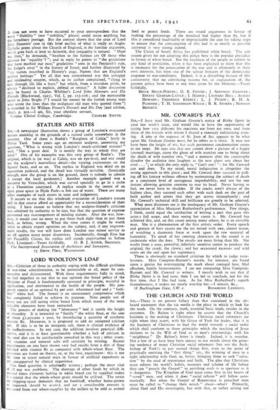LORD WOOLTON'S LOAF
Sia,—Criticism of those in authority coping with the difficult problems of war-time administration, to be permissible at all, must be con- structive and disinterested. With these requirements fully in mind, we feel impelled to say that in our opinion the bread policy of the Minister of Food is fundamentally unsound in principle, wasteful in application, and detrimental to the health of the people. His pro- posals consist of an optional 85 per cent. wheatmeal loaf and a " forti- fied " white loaf. The former is an unnecessary compromise which has completely failed to achieve its purpose. Nine people out of every ten are still eating white bread from which many of the most valuable elements have been extracted.
The process of making the "laboratory " loaf is surely the height of absurdity. It is intended to "fortify" the white flour, at the cost of about Lt,25o,00o a year, by introducing a quantity of synthetic vitamin Bt. Moreover, it is proposed to add an unnamed calcium salt. If this is to be an inorganic salt, there is clinical evidence of its ineffectiveness. In any case, the addition involves practical diffi- culties, and •it is at least questionable whether a lack of calcium in the total diet can be satisfactorily remedied in this way ; other essen- tial vitamins and mineral salts will certainly be missing. Recent experiments on rats have shown sery bad results from a diet of flour fortified with vitamin Bt as compared with whole-wheat flour. The Proposals are based on theory, or, at the best, experiment: this is not the time to reject natural ways in favour of artificial expedients as yet unsupported by clinical experience.
The food question is admittedly serious ; perhaps the most vital of all our war problems. The shortage of other foods by which in normal times elements lacking in white bread can be supplied makes it essential that the whole-wheat grain should be utilised. The strain on shipping-space demands that no foodstuff, whether home-grown or imported, should be wasted, and yet a considerable amount is extracted from our wheat-supplies by the millers to be sold as animal
feed or patent foods. There are sound arguments in favour of making the percentage of the standard loaf higher than 85, but if this is considered inadvisable or impracticable the case for taking steps to ensure that the consumption of this loaf is as nearly as possible universal is very strong indeed.
The Union of South Africa has prohibited white bread. ' The sole reason given for not adopting this policy here is the popular prejudice in favour of white bread. But the readiness of the people to submit to any kind of restriction, when it has been explained to them that this is necessary for the prosecution of the war and is ultimately in their own interests, has been one of the salient features of the democratic response to war-conditions. Indeed, it is a disturbing feature of this controversy that no convincing reasons for, or explanation of, the present policy have been at any time given by the Minister.—Yours faithfully,
BRUCE BRUCE-PORTER ; G. E. FRIEND ; J. ADDYMAN GARDNER ; ERNEST GRAHAM-LITTLE ; I. HARRIS ; LEONARD HILL ; At BERT HOWARD ; FREDERICK KEEBLE ; L. J. PICTON ; R. H. A. PLIMMER ; T. IL SANDERSON-WELLS ; R. R. STOKES ; NORMAN BENNETT.

























 Previous page
Previous page